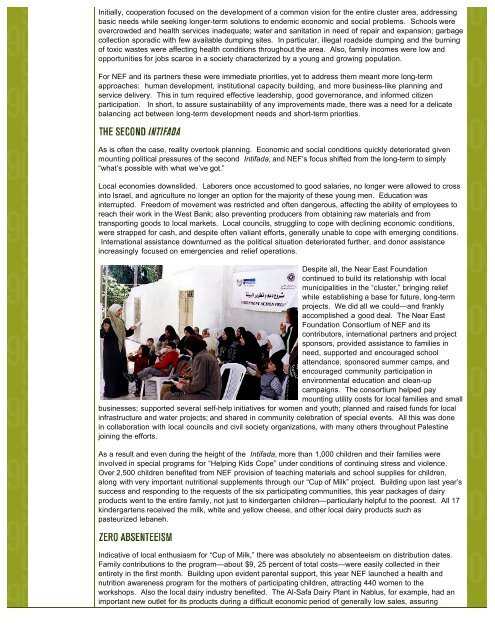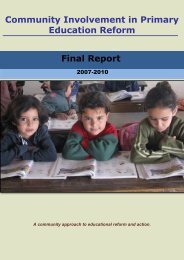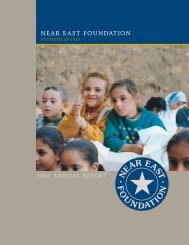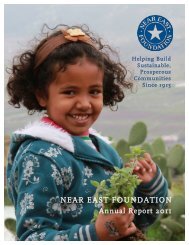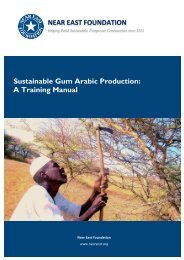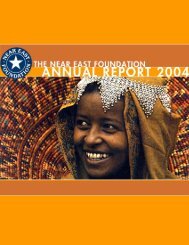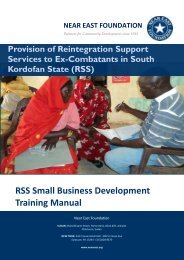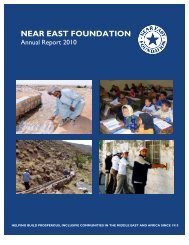NEF 2005 Annual Report - Near East Foundation
NEF 2005 Annual Report - Near East Foundation
NEF 2005 Annual Report - Near East Foundation
Create successful ePaper yourself
Turn your PDF publications into a flip-book with our unique Google optimized e-Paper software.
Initially, cooperation focused on the development of a common vision for the entire cluster area, addressing<br />
basic needs while seeking longer-term solutions to endemic economic and social problems. Schools were<br />
overcrowded and health services inadequate; water and sanitation in need of repair and expansion; garbage<br />
collection sporadic with few available dumping sites. In particular, illegal roadside dumping and the burning<br />
of toxic wastes were affecting health conditions throughout the area. Also, family incomes were low and<br />
opportunities for jobs scarce in a society characterized by a young and growing population.<br />
For <strong>NEF</strong> and its partners these were immediate priorities, yet to address them meant more long-term<br />
approaches: human development, institutional capacity building, and more business-like planning and<br />
service delivery. This in turn required effective leadership, good governorance, and informed citizen<br />
participation. In short, to assure sustainability of any improvements made, there was a need for a delicate<br />
balancing act between long-term development needs and short-term priorities.<br />
As is often the case, reality overtook planning. Economic and social conditions quickly deteriorated given<br />
mounting political pressures of the second Intifada, and <strong>NEF</strong>’s focus shifted from the long-term to simply<br />
“what’s possible with what we’ve got.”<br />
Local economies downslided. Laborers once accustomed to good salaries, no longer were allowed to cross<br />
into Israel, and agriculture no longer an option for the majority of these young men. Education was<br />
interrupted. Freedom of movement was restricted and often dangerous, affecting the ability of employees to<br />
reach their work in the West Bank; also preventing producers from obtaining raw materials and from<br />
transporting goods to local markets. Local councils, struggling to cope with declining economic conditions,<br />
were strapped for cash, and despite often valiant efforts, generally unable to cope with emerging conditions.<br />
International assistance downturned as the political situation deteriorated further, and donor assistance<br />
increasingly focused on emergencies and relief operations.<br />
Despite all, the <strong>Near</strong> <strong>East</strong> <strong>Foundation</strong><br />
continued to build its relationship with local<br />
municipalities in the “cluster,” bringing relief<br />
while establishing a base for future, long-term<br />
projects. We did all we could—and frankly<br />
accomplished a good deal. The <strong>Near</strong> <strong>East</strong><br />
<strong>Foundation</strong> Consortium of <strong>NEF</strong> and its<br />
contributors, international partners and project<br />
sponsors, provided assistance to families in<br />
need, supported and encouraged school<br />
attendance, sponsored summer camps, and<br />
encouraged community participation in<br />
environmental education and clean-up<br />
campaigns. The consortium helped pay<br />
mounting utility costs for local families and small<br />
businesses; supported several self-help initiatives for women and youth; planned and raised funds for local<br />
infrastructure and water projects; and shared in community celebration of special events. All this was done<br />
in collaboration with local councils and civil society organizations, with many others throughout Palestine<br />
joining the efforts.<br />
As a result and even during the height of the Intifada, more than 1,000 children and their families were<br />
involved in special programs for “Helping Kids Cope” under conditions of continuing stress and violence.<br />
Over 2,500 children benefited from <strong>NEF</strong> provision of teaching materials and school supplies for children,<br />
along with very important nutritional supplements through our “Cup of Milk” project. Building upon last year’s<br />
success and responding to the requests of the six participating communities, this year packages of dairy<br />
products went to the entire family, not just to kindergarten children—particularly helpful to the poorest. All 17<br />
kindergartens received the milk, white and yellow cheese, and other local dairy products such as<br />
pasteurized lebaneh.<br />
Indicative of local enthusiasm for “Cup of Milk,” there was absolutely no absenteeism on distribution dates.<br />
Family contributions to the program—about $9, 25 percent of total costs—were easily collected in their<br />
entirety in the first month. Building upon evident parental support, this year <strong>NEF</strong> launched a health and<br />
nutrition awareness program for the mothers of participating children, attracting 440 women to the<br />
workshops. Also the local dairy industry benefited. The Al-Safa Dairy Plant in Nablus, for example, had an<br />
important new outlet for its products during a difficult economic period of generally low sales, assuring


